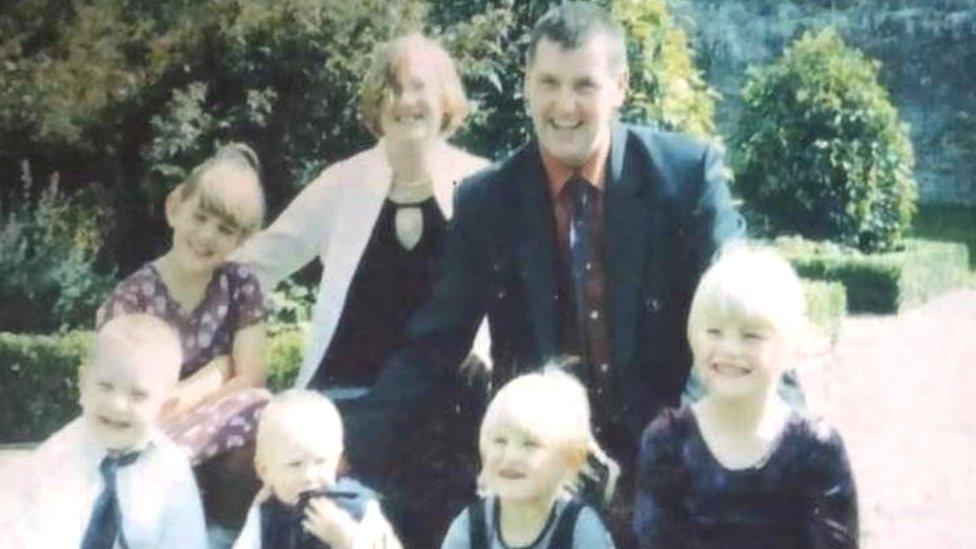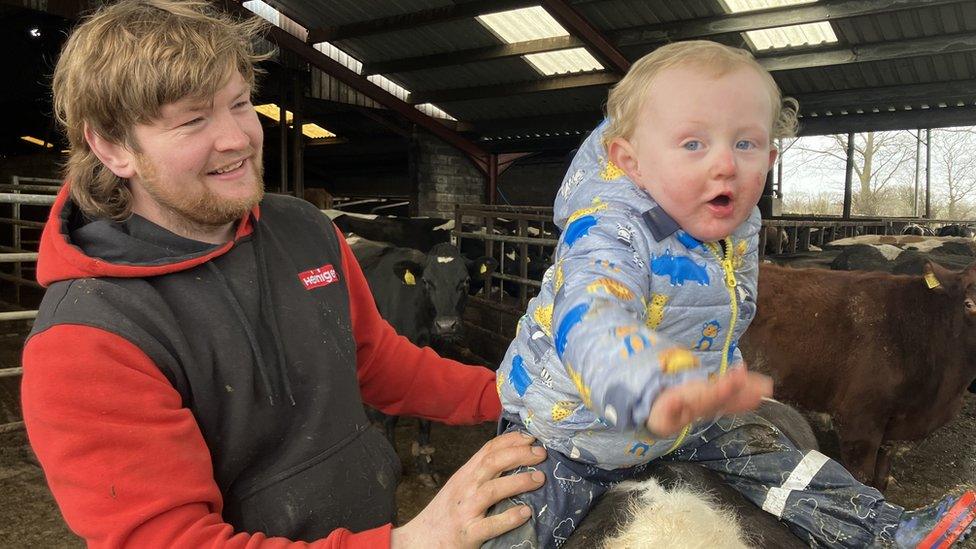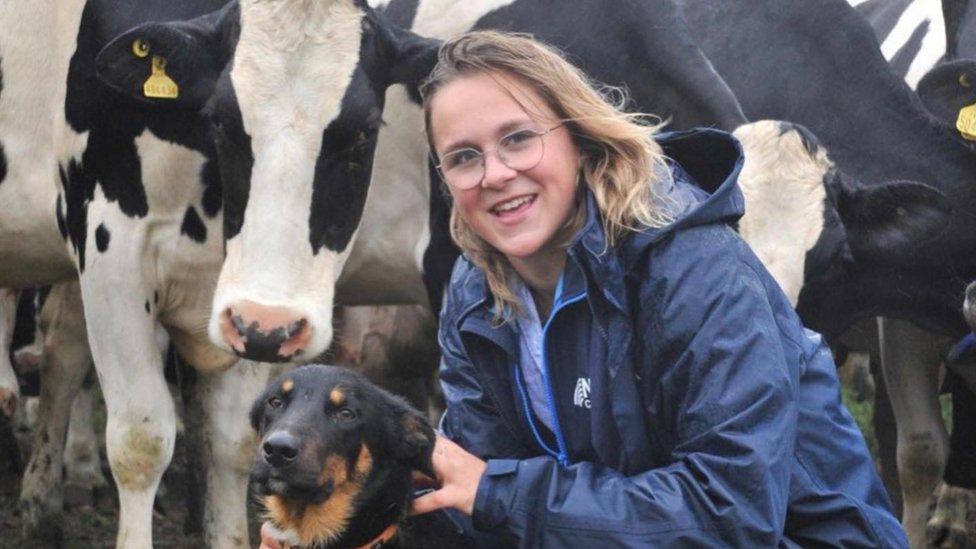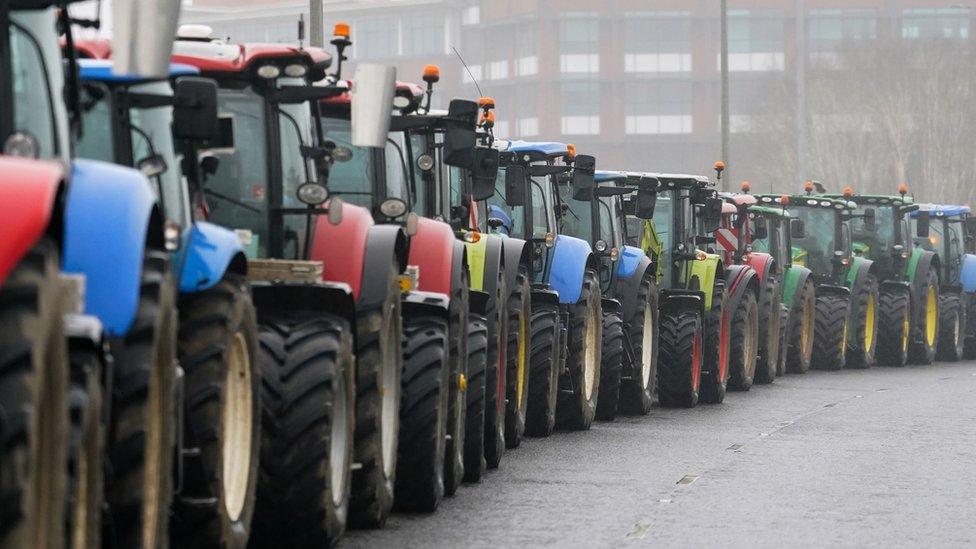Farmer protests: Son of killed farmer on TB devastation
- Published

Maldwyn Harries died in 2022 after being knocked unconscious by a bull during bovine TB tests
A farmer whose father was killed by a bull during TB testing has said the Welsh government does not understand the devastation of the disease.
Mark Harries, 26, said the Welsh government's farming proposals, which have prompted weeks of protest, were "not a step forward".
Maldwyn Harries was knocked unconscious at the family farm in Carmarthenshire in 2022 and later died.
The Welsh government said it was "determined to eradicate bovine TB".
"It feels to us as a family, my father was just another statistic, like another cow, just gone," said Mr Harries.
At an inquest into Maldwyn Harries's death, the coroner said the incident was a sad example of an "unusual and infrequent occasion" and the Health and Safety Executive confirmed the farm had all the "correct equipment" for the test.
While Mr Harries acknowledges it was freak accident, he wants the Welsh government to look closer at its policy.
He has criticised its proposals, which include mandating 10% of land for trees and the implementation of a bovine tuberculosis advisory group, which he claimed was "not a step forward".
He said above all he wanted to see a cull of badgers to curb the spread of TB, not more government meetings.
"This group is only probably going to tell [Rural Affairs Minister Lesley Griffiths] the same. She could've made this decision [to cull badgers] last year or the year before, they just clearly don't want to know." he said.

Mark Harries's newest helper on the farm in in Cefnrhiwlas, Carmarthenshire, is his one-year-old son Tomi
Wildlife Trusts Wales said while it sympathised with farmers, bovine TB "is a disease of cattle and is primarily spread by cattle".
"That is why the continuing focus has to be on cattle measures to control and ultimately eliminate this disease," a spokeswoman said.
What is bovine TB?
Bovine TB is an infectious disease that affects farm animals such as cattle and pigs, and wild mammals like badgers, foxes and deer - an infected animal may go undetected for months, but ultimately the disease is fatal.
Mr Harries's farm has been clear of the disease for a year, but was locked down for more than two years.
"We were just down to milking 30 cows... how are you meant to pay your bills losing 140 cows?" he said.
Mr Harries said proposed changes requiring farmers to commit 10% of agricultural land to trees and 10% earmarked for wildlife would not improve TB numbers.
About 100 farmers in tractors held a go-slow protest in Newtown, Powys, in February
"To me, you plant 10% extra of habitat on your farm, that gives 10% extra for these wild creatures to go and live in," said Mr Harries.
"Without a cull to control this thing, you're giving them more places to live, more badgers to spread it, it's not a win, win situation."
On Tuesday the Welsh government appointed a Bovine TB Technical Advisory Group to look at the current on-farm slaughter policy.
Plaid Cymru organised a debate at the Senedd to discuss the disease and members showed their frustration towards the Welsh government's current TB policy.
"I bet you, this year's annual statement could be the very statement that was given ten years ago," said Plaid Cymru Member of the Senedd (MS) Llyr Gruffydd.
"After a decade of testing in Wales, we haven't gained much ground, have we."
Conservative MS Samuel Kurtz said: "How can we be so blindsided by this disease, yet look to attack and eradicate other diseases?"
The Welsh government said it was "very aware of the distressing impact of bovine TB on the health and well-being of our farmers and their families".
"This is why we are absolutely determined to eradicate bovine TB in Wales," it said, adding it was "committed to exploring other approaches to on-farm slaughter".
Related topics
- Published28 March 2023

- Published28 February 2024

- Published23 February 2024
